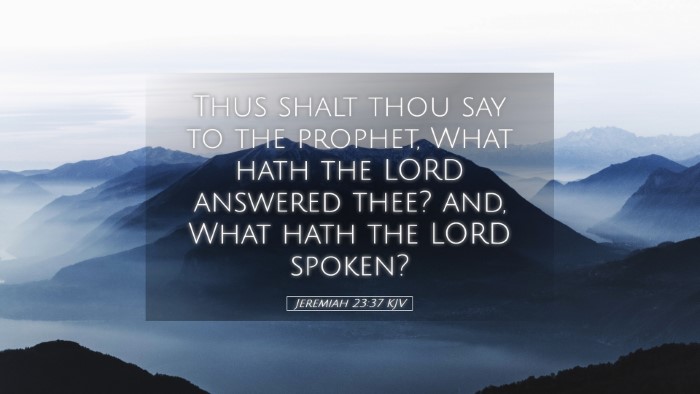Commentary on Jeremiah 23:37
In the profound lamentations and prophecies of Jeremiah, we encounter a pivotal moment in Jeremiah 23:37, where the prophet offers a penetrating insight into the nature of divine revelation and the responsibilities of the messengers of God.
Text of Jeremiah 23:37
"Thus shalt thou say to the prophet, What hath the LORD answered thee? And what hath the LORD spoken?"
Contextual Background
The book of Jeremiah, situated in a tumultuous historical context, unfolds during a time of moral decay and impending judgment for the people of Judah. The theme of false prophets versus true prophets becomes particularly salient in this chapter. Jeremiah, as a true prophet, often finds himself in stark contrast with other prophets who speak smooth words, misleading the people into a false sense of security.
The Significance of Divine Communication
The verse emphasizes the necessity of seeking the voice of the Lord. Here, Jeremiah challenges the people to discern the genuine word of the Lord amid a plethora of erroneous teachings. It reminds us of the responsibility each believer has to confront falsehood and uphold the truth.
Insights from Matthew Henry
Matthew Henry notes that this inquiry posed to the prophet underscores a vital function of prophetic ministry. He asserts that the people are encouraged to seek knowledge from the true prophets—those who accurately convey the messages from God. This verse serves as a reminder that hearing from God should not be taken lightly and that the messages delivered must be based on divine truths rather than human imaginations.
Insights from Albert Barnes
Albert Barnes highlights the importance of inquiry in this verse. He elucidates that the questions posed about what the Lord has spoken encapsulate the human desire for guidance and assurance from God. Barnes stresses that true prophets are accountable to declare the full counsel of God, urging those who listen to critically evaluate their messages against the backdrop of scripture and the character of God.
Insights from Adam Clarke
Adam Clarke points out the critical nature of the questions being asked. Clarke mentions that these inquiries not only seek understanding but also reflect a deep-rooted need for authenticity in faith. He illustrates the contrast between true messages from God versus the deceptive messages endorsed by false prophets. According to Clarke, this verse serves as a call to vigilance among the people regarding their spiritual leaders.
The Role of Inquiry in Spiritual Life
Throughout scripture, the act of inquiry signifies a profound engagement with one's faith. It symbolizes a yearning for clarity regarding God's voice and His will. As noted by the commentators, this verse acts as an invitation for believers to actively seek God’s revelation and to scrutinize the messages they receive.
Practical Applications for Today
- Encouragement to Seek God: Believers today are called to persistently seek the Lord’s guidance in their lives, echoing the foundational lesson in Jeremiah 23:37.
- Discernment of Messages: It is crucial for believers, scholars, and leaders to develop discernment, ensuring that they are aligned with the true word of God.
- Accountability of Leaders: Pastors and theological leaders must recognize their responsibility to communicate God’s truths faithfully as representatives of His word.
Conclusion
The message encapsulated in Jeremiah 23:37 serves both as a historic lens into the prophetic ministry and a timeless exhortation for all who seek to understand God’s dealings today. By engaging with the insights from public domain commentaries, readers can appreciate the layered meanings inherent within this verse and apply its teachings fruitfully in a modern context.


